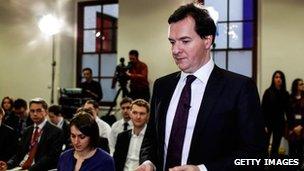Future BoE chief Mark Carney sees 'merit' in policy debate
- Published
Mark Carney says he could use "new instruments" to provide an economic stimulus
The future governor of the Bank of England (BoE), Mark Carney, has not ruled out changes to the way the bank runs monetary policy.
Speaking to members of the House of Commons' Treasury Committee, Mr Carney said there was "merit" in discussing the bank's monetary policy framework.
But he said the current policy of inflation targeting had been the most successful.
Mr Carney will take over as BoE governor in July.
He is currently the governor of the Bank of Canada and will become the first foreign BoE governor in its history when he takes over the reins from Sir Mervyn King.
Mr Carney said the bank's long-time policy of targeting inflation had proved successful in both the UK and Canada, setting a "high bar" for any alternative policy.
"The flexible inflation-targeting framework should remain broadly in place," he said. "But details need to be reviewed and could be changed."
He also pointed to the current system in Canada whereby the remit of the central bank is reviewed every five years.
The current remit of the BoE is to target inflation of 2%.
Mr Carney stressed that any changes to the bank's remit would be a decision for the chancellor and the government, but said "there is merit in debating the framework in Britain and coming to relatively quick conclusion on it".
'Full stimulus needed'
He said he had been involved in some high level discussions about alternatives to the bank's remit since delivering a speech in December in which he discussed targeting nominal GDP - a measure that takes into account inflation and growth.

Chancellor George Osborne believes the BoE could do more to stimulate growth
But he said the discussions had not been detailed.
Mr Carney, who is still six months away from taking the reins at the BoE, would not commit to taking specific measures to boost economic growth, but said it was clear "full monetary stimulus" was required to help the economy.
"If more is required once I'm in office, I will do my best to persuade my colleagues [of that]," he said.
Both the Chancellor George Osborne and current governor Sir Mervyn King have suggested the bank could do more.
Since the economic crisis began in 2008 the bank has kept interest rates at historic lows and implemented quantitative easing to inject £375bn of liquidity into the financial markets.
As the Treasury Committee hearing continued, the BoE's Monetary Policy Committee voted to keep rates on hold at 0.5%, nearly four years after they were cut to that level.
Stephanie Flanders' expert analysis
Before answering questions on monetary policy, Mr Carney was forced to defend the pay deal he has agreed for his five-year term as governor.
Mr Carney's remuneration includes a salary of £480,000, plus an annual pension allowance of £144,000 and a housing allowance of £250,000.
He defended the housing allowance, arguing that such arrangements were "common" for executives moving to London, which he characterised as "one of the most expensive capital cities in the world".
His current home of Ottawa, he noted, was one of the cheapest.
Mr Carney also said his scheduled five-year term as governor would be enough to ensure the "relaunch" of the bank, which is taking on additional responsibility for banking regulation and financial stability, along with monetary policy.
Previous governors have served for eight-year terms, but Mr Carney was offered a shorter term after he initially decided not to apply for the job.
- Published7 February 2013
- Published22 January 2013
- Published29 January 2013
- Published12 December 2012
- Published26 November 2012